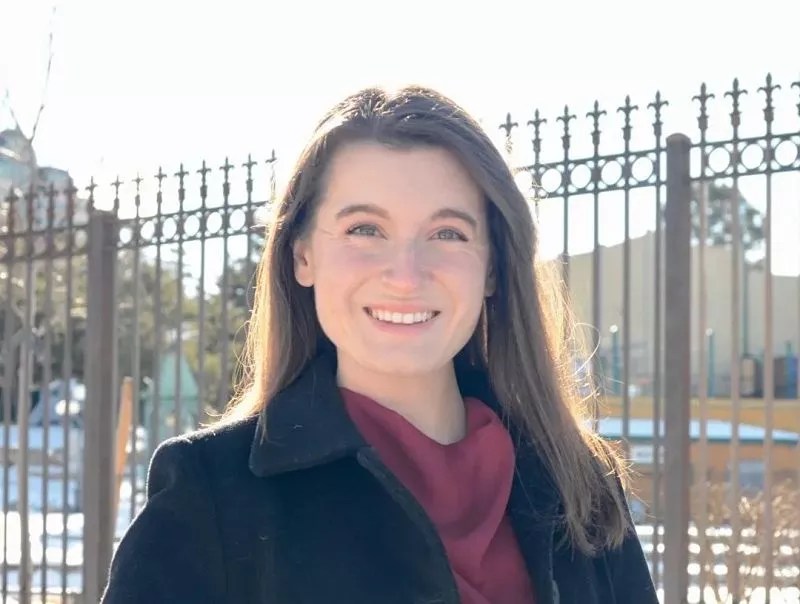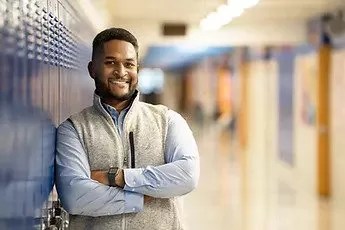
Courtesy of Ruby Dickson

Audio By Carbonatix
A campaign mailer advocating for Ruby Dickson, a 26-year-old climate economist who grew up in Louisville and is a Democratic candidate for House District 37, showed up in mailboxes in Greenwood Village, Centennial and Foxfield earlier this month. The return address was for a Boulder-based organization named Building a Better Colorado.
But it wasn’t the Building a Better Colorado established in 2015 as a “diverse, nonpartisan coalition of Coloradans [that] has come together with the shared belief that Colorado can do better than the divisive arguments that have come to dominate our political discourse.” And when that Building a Better Colorado caught wind of this imposter, the original organization sent out an email on February 21 to a listserv complaining about “this abuse of BBCO’s good name.”
Hours later, Dickson took to Twitter to “call upon any organization that supports my campaign to be transparent and follow the rules,” she said. “I’m proud of the work I’ve done and the support I’ve earned, and that support needs to come in the right way. Specifically, any organization that supports my campaign should be open about who they are, and what causes they are advocating for.”
Her swift action earned Dickson praise from the original Building a Better Colorado.
“For seven years, we’ve built our cred on being nonpartisan, a convener of honest dialogue, non-advocacy, that’s the whole brand,” says Reeves Brown, project manager there. “And then in one mailer, an independent expenditure committee out of Phoenix can just – not blow it up, but can certainly raise a lot of confusion.”
On February 11, two people registered with the Colorado Secretary of State’s Office as agents for the second Building a Better Colorado: Dacey Montoya and Julia Josefchuk-Mancini, both of whom gave email addresses for a Phoenix-based political campaign compliance organization called the Money Wheel Compliance. Montoya and Josefchuk-Mancini did not respond to requests for comment.
“I do not know those people,” Dickson says of the political action committee billing itself as Building a Better Colorado.
On TRACER, the online campaign finance database for Colorado, the new Building a Better Colorado behind the mailer describes itself as an organization that supports “pragmatic candidates, regardless of party affiliation, who take a long term view on policy planning and are focused on helping us prepare for the next pandemic, who is running for [the] state legislature.”
On February 11, Montoya and Josefchuk-Mancini also registered a political action committee in Colorado named Protect Our Future. That organization has the same stated goal as the imitation Building a Better Colorado.
And that goal is quite similar to the goal of the Denver Pandemic Fund, which pushed an odd November 2021 Denver ballot initiative that sought to increase the marijuana sales tax in order to fund research to help the world become better prepared for the next pandemic. That initiative lost by over 60 percent of the vote.
In the run-up to that election, Westword reported that the campaign behind the measure had received hundreds of thousands of dollars from Washington, D.C.-based Guarding Against Pandemics.
That organization, which has been around since mid-2020, was started by Gabriel Bankman-Fried, who has worked for Democratic and progressive political causes. Bankman-Fried’s brother, Sam, is a cryptobillionaire with an estimated net worth of $22.5 billion; Guarding Against Pandemics notes on its website that some of its money comes from Sam Bankman-Fried. After its failed campaign in Denver last year, the political action committee is funding a statewide initiative effort in California, aiming to land a measure on the November ballot that would increase the tax on people who earn over $5 million in personal income by 0.75 percent for ten years to fund pandemic-preparedness research.
The most recent campaign finance report on TRACER shows that Dickson’s campaign has pulled in $25,077 from a total of 104 donors – just 25 of them people with a Colorado address. The rest of the contributions came from various other locations, including New York, California, Maryland, Massachusetts and even the United Kingdom, where Dickson went to graduate school at the University of Oxford.
“I have connections and friends all over the country. That makes sense, and it’s also something that I’m really proud of. That’s not something that I think is particularly weird,” says Dickson, who returned to Colorado from the U.K. last July, settling in Greenwood Village. Dickson works for the San Francisco-based Rethink Priorities, where she “advises charitable foundations on finding solutions for poverty and climate change,” she says.
It may not be weird, but it is unusual, according to Pete Quist, deputy research director at OpenSecrets, a D.C. nonprofit. “In Colorado, Statehouse candidates typically do raise the vast majority of their money within the state. It has ranged from 88 to 89 percent. It’s pretty consistent, pretty high,” he says. “It is certainly possible that if she has been talking with people that she knows that are out of state and mentions that she’s running for election; they may be making contributions to her campaign for that reason.”
Dickson’s initial campaign finance report was filed on January 18, and doesn’t capture donations sent in after December 31. She contends that “more than half” of her total donations are from people in Colorado.
But what’s also noteworthy about Dickson’s campaign finance report is that many of the donors overlap with individuals who donated to the Guarding Against Pandemics political action committee, according to the Federal Election Commission database.
Over the course of 2021, Guarding Against Pandemics raised $84,131 from a total of 22 individuals – ten of whom also donated to Dickson. She also received a contribution from a staffer of Guarding Against Pandemics.
“My campaign doesn’t have any connection to Guarding Against Pandemics. I’ve heard about them partially because I run in similar social circles to Gabe Bankman-Fried, who is one of the founders of it, I think,” Dickson says. “I have not really talked to Gabe at all about my campaign. As far as I know, he has not been activating any networks. I know him through shared social circles. I met him through grad school.”
Dickson has hired local consultant Gabriel Claeson to assist her campaign; he ran the Denver Pandemic Fund campaign in 2021, as well as the Caring 4 Denver campaign in 2018. Dickson says that Bankman-Fried introduced her to Claeson.
“I am aware, from Ruby telling me, that she has a wide network of supporters that include climate activists, members of the LGBTQ+ community, women’s-rights advocates, and members of the Jewish community,” says Claeson. “I know that she knows Gabriel Bankman-Fried because he referred her to me for consulting. And I know, from Ruby telling me (not my personal knowledge), that they know a lot of the same people. I don’t know most of her donors myself. I also know that 100 percent of her donations are from individual donors.”
Like Dickson, Claeson says he has “no personal knowledge” about the Boulder-based Building a Better Colorado. “I found out about them at the same time as everyone else, when a mailer landed last week,” he notes.
Guarding Against Pandemics did not respond to an email sent by Westword with questions for Bankman-Fried. But there’s some evidence that Guarding Against Pandemics could be behind the imitation Building a Better Colorado.
On December 1, 2021, Guarding Against Pandemics sent $5,000 to the Money Wheel Compliance – the company that registered the Building a Better Colorado organization earlier this month – for accounting and compliance consulting. When it was active, the Denver Pandemic Fund campaign also paid the Money Wheel Compliance for compliance and consulting.
The Denver Pandemic Fund’s campaign treasurer was a person named Michael Sadowsky. A LinkedIn profile for Michael Sadowsky shows that he’s president of Protect Our Future, the name of the group registered in Colorado by the Money Wheel Compliance staffers who also registered the imitation Building a Better Colorado. Sadowsky also shows up as a contributor to both Dickson’s campaign and Guarding Against Pandemics.
“I know him only kind of tangentially,” Dickson says of Sadowsky.

Ken Stable is running against Ruby Dickson in the House District 37 Democratic primary.
Courtesy of Ken Stable
Dickson’s campaign finance report shows her easily outraising her Democratic competition, 35-year-old Ken Stable, who has worked in tech and finance and is currently studying for a law degree at the University of Denver. His January 18 report shows he’d pulled in $8,695 by the end of 2021.
Both candidates have strong résumés. Dickson, a “lifelong Democrat,” says she grew up poor and wants to work for poverty alleviation and against climate change.
Stable, who was born in Aurora, also grew up poor and says he experienced homelessness while moving around metro Denver with his single mother. “A large part of why I’m running is because of my experience with that…experiencing homelessness, and more opportunities that I’ve had,” says Stable, who notes that he’d like to work on affordable housing and collective-bargaining rights if elected.
Stable says he hasn’t closely examined Dickson’s campaign finances and doesn’t plan to. Instead, he wants to run a “clean race” and is focused on making sure the seat stays safe for a Democrat. “I just wish whoever comes out on top, I want to make sure that the people are spoken for,” Stable says.
A big supporter of Barack Obama when he was running for office in 2008, Stable says he’s always identified as a Democrat, though he didn’t register as one until October 2021, about a month before filing to run for elected office. “Because I was in the nonprofits and the financial center, I left myself unaffiliated,” he explains. “I didn’t want my affiliation to get in the way of conversations with donors or clients. With everything that happened in 2020 and the pandemic, I had the calling and could no longer refuse.”
Stable’s contributions have also come in for scrutiny because he’s taken donations from Republicans. “I’ve been helped out by several Republicans, people who are independents and unaffiliated through my lifetime. The family that took me in were Republicans. There’s no short supply of them,” says Stable. “These are the people who took me out of poverty and let me pursue my education.”
The HD-37 seat is currently represented by Tom Sullivan, a Democrat who is running in the Senate District 27 race. Centennial businessman Paul Archer, a Republican, has also declared his candidacy for the HD-37 seat.
Both Stable and Dickson plan to go through the Democratic caucus, set for March 5 in Arapahoe County precincts. They each need at least 30 percent of the vote to continue through the process and land on the Democratic primary ballot on June 28.
“It’s very likely, because there are two of them, that both will get 30 percent,” says Kristin Mallory, chair of the Arapahoe County Democrats. “I actually think it’s one of our more competitive seats…I wouldn’t call it safe. I actually think it’s one of our toss-up seats.”
And certainly the seat with one of the strangest stories of the campaign so far.
“Ruby was very responsive and said she had nothing to do with this and was equally frustrated,” the real Building a Better Colorado’s Brown says of the imitation Building a Better Colorado. “I appreciate she did that, because I know they’re independent by nature, but candidates, it’s hard to not take any support that you can get.”